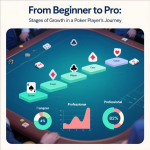One of the most overlooked skills in poker isn’t about reading opponents or bluffing—it’s about managing your bankroll. Even the most skilled players can go broke if they don’t handle their poker funds wisely. Bankroll management ensures you can keep playing, minimize risk, and maximize your chances of long-term success.
1. What Is Bankroll Management in Poker?
Your bankroll is the amount of money set aside solely for playing poker. Managing it means controlling how much you risk in each game or tournament so that short-term losses don’t wipe you out.
2. Why Bankroll Management Matters
Poker is a game of skill mixed with variance. Even great players can face losing streaks. Without bankroll discipline, one bad night could end your poker journey. Proper management keeps you in the game long enough for your skills to pay off.
3. Set a Dedicated Poker Bankroll
Never mix your poker money with personal expenses. Create a separate bankroll that you can afford to lose, and treat it like an investment in your game.
4. Follow the 5% Rule
A common strategy is to never risk more than 5% of your bankroll in a single game or tournament. For cash games, that means sitting down only with stakes your bankroll can comfortably cover.
5. Adjust for Cash Games vs Tournaments
- Cash games: It’s often recommended to have at least 20–30 buy-ins for the stakes you’re playing.
- Tournaments: Variance is higher, so many pros suggest having 50–100 buy-ins in your bankroll.
6. Track Wins and Losses
Keep a record of every session. Tracking helps you spot patterns, understand variance, and know when it’s time to move up—or down—in stakes.
7. Know When to Move Up or Down
If your bankroll grows, you can move up to higher stakes. But if you drop below a safe level, step down to lower stakes until you recover. Smart players know when to protect their bankroll instead of chasing losses.
8. Emotional Discipline Is Key
Tilt (emotional decision-making) is the enemy of bankroll management. Stick to your limits, avoid chasing losses, and focus on making the best decisions rather than gambling on luck.
Final Thoughts
Bankroll management might not be as flashy as pulling off a perfect bluff, but it’s the foundation of long-term poker success. By playing within your means, tracking your results, and protecting your bankroll, you’ll give yourself the best chance to not just play today—but to stay in the game for years to come.
Another article:


